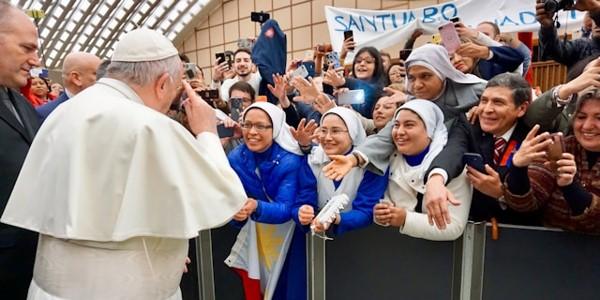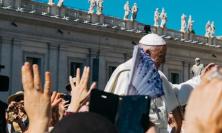Michael Barnes SJ predicted at the beginning of Francis’ papacy that the first Jesuit pope would be ‘a good communicator’, and twelve years later we can see how accurate a forecast that was. The pope’s commitment to dialogue as a conduit to God underpinned his vision for and service to the Church.
I shall not forget the evening Pope Francis was elected. I was teaching my MA course in theology of religions, and we had come to the end of the first hour. I announced a break but was interrupted by a distracted student who was looking at his mobile. ‘White smoke’, he called out. After a flurry of excitement, we got back to the second half of the class. An hour later I finished the lecture, packed my books and made to leave. ‘Don’t you want to know who it is?’ asked the student with the mobile. A moment of silence, the name was called out. Blank looks all round. Apart from me, nobody knew who Jorge Bergoglio was. And even I was ignorant of the dark period of his life in the mid-1970s, what he had suffered as Jesuit provincial in the dark days of the junta.
Very soon we got to know him. We came to love a man of moral integrity and compassion for the suffering, a man who radiated an austere yet gentle inner strength, a man whose delightful smile and personal warmth radiated a simplicity of life and an engaging humility. A few weeks after the election I was invited to speak on a BBC radio programme about Jesuits and Ignatian spirituality. I thought I was doing reasonably well until, right at the end, I was asked what I thought the new pope would be remembered for. I really had no idea and so, with hardly a moment to think, I replied: ‘he’ll be a good communicator’.
I think that instinctive response was right then. And I have no reason to change my mind now. But Francis was more than a good Jesuit schoolmaster brought up on the age-old principles of the Ratio Studiorum. He was that rare individual who had somehow managed to marry his spiritual and theological training with a wonderful pastoral sensitivity which took every person, from bishops and learned theologians to the poorest of the poor, with the utmost seriousness – because all of us are made in the image and likeness of God.
It was not long before I was bringing his wisdom and experience into my own teaching. Soon after his election, an enterprising publisher brought out an English translation of a series of conversations which the then Archbishop of Buenos Aires had held with a Jewish friend, Rabbi Abraham Skorka. On Heaven and Earth witnesses to what becomes possible in interreligious dialogue when suspicion and fear give way to mutual esteem and a readiness to learn.[i] In the introduction, Francis says that with Rabbi Skorka, ‘I never had to leave my Catholic identity behind, just as he didn't have to ignore his Jewish identity. Our challenge was to proceed with respect and affection, trying to be above reproach as we walked in the presence of God.’
This theme of the God who becomes present to human beings by inviting them into the depths of a loving relationship runs through their conversations. This is the Ignatian spirituality of a Jesuit pope in dialogue with the wisdom of the Talmud. Francis and Rabbi Skorka have in common a deep desire to experience and relish the things of God that have their roots in liturgy and in learning.
One little exchange has stayed with me. In the first chapter, it seems as if the conversation is about to take off into a discussion of the realms of interiority and mystical states. Very quickly, however, it mixes the theological and the intensely practical, an exchange about the interaction ‘between task and gift’. Rabbi Skorka says that, ‘in Judaism God is honored by our compliance with the precepts that he revealed’. Pope Francis agrees. Creation is a gift from God, and human beings are called to work freely and generously for the sake of their world.
The problem, however, is that we so easily fall into what Francis calls the ‘Babel syndrome’, the arrogance which sees everything we achieve as the fruit of our own labour. This leads Skorka to introduce a Talmudic interpretation of the episode. The one who builds the tower is a tyrant who holds so tight a grip on power that the people may only speak one language – his. The tower is thus symbolic of human pretension – to presume that one’s own efforts bring one close to God. Language in these terms is despotic, not universal: an alien imposition that punishes and oppresses, not a gift that overcomes violence and communicates without hindrance.
Francis’s last two predecessors had much to say about the importance of interreligious dialogue, and they went beyond words by calling religious leaders to meet at Assisi, John Paul II in 1986 and Benedict XVI in 2011. Both focused on what are often referred to as the dialogues of theological exchange and religious experience, and both drew on considerable personal knowledge of, and respect for, Judaism. Francis’ contribution to dialogue is based on the same foundations but he takes us in a different direction. On Heaven and Earth is a record of the friendship God brings to birth between two generous, listening hearts, and a witness to the power of God’s own Word to awaken a deep responsibility for the whole of suffering humanity. Francis focuses on two less familiar, but increasingly necessary, dialogues: common life and common action – the practical or pastoral basis for all interpersonal relations. In Evangelii gaudium,[ii] towards the end of a long chapter on the ‘Social Dimension of Evangelization’, he has this to say:
An attitude of openness in truth and in love must characterize the dialogue with the followers of non-Christian religions, in spite of various obstacles and difficulties, especially forms of fundamentalism on both sides. Interreligious dialogue is a necessary condition for peace in the world, and so it is a duty for Christians as well as other religious communities. … In this way we learn to accept others and their different ways of living, thinking and speaking. We can then join one another in taking up the duty of serving justice and peace, which should become a basic principle of all our exchanges. (§250)
For Francis, the dialogue between religions has an inescapably ethical and political dimension. I find it ironic that the last official visitor to meet him on the day before he died was US Vice President JD Vance, a Catholic convert and one of the most strident critics of all things ‘woke’ and liberal, including, no doubt, dialogue in all its forms. What they spoke about in that brief exchange is, of course, unknown, but it’s unlikely to have included a reference to something Francis says in conversation with Rabbi Skorka. When one reads Maimonides and St Thomas Aquinas, he says, ‘we see that they always start by putting themselves in the position of their adversary in order to understand them; they dialogue from the standpoint of the other’.
Spelled out in such terms, ‘other’ is not a term that appears to feature in the Trump lexicon. For the populist demagogue, ‘the other’ is a migrant with malign intent, the enemy of the people and source of all ‘our’ ills; not a potential partner in a common enterprise but a competitor in the power game of ‘the deal’. By contrast, Pope Francis, brought up in Peronist Argentina, influenced by liberation theology and formed by an Ignatian spirituality that made him antagonistic to self-serving elites of all kinds, bases his political and economic thought squarely on the paschal mystery of Christ and instinctive wisdom of those committed to what the gospel teaches about a life of prophetic virtue.
Francis’ exhortations are anything but ‘populist’ – building on a collusion of grievance between the great leader and the willing elect. Francis’ capacity for leadership and communication is very different. For a start it is not about himself. In those desolating years as Jesuit provincial in Argentina he learned that – paradoxically – leadership is about becoming strong through vulnerability. And, secondly, it was about letting ‘the people’ be themselves, ordinary suffering humanity with their own dignity, not coercing them into acting as willing foot-soldiers obedient to every command of the great leader. Whatever skills he possessed as a communicator were based on a remarkable capacity to listen; that’s why he set such store by his vision of the synodal Church.
As a true man of the Church, he exercised a wonderfully Christ-centred and typically Jesuit pastoral cura personalis. There is more to ‘pastoral’ than an evocative metaphor from distant tradition. For Francis it spoke of a mode of communication that emphasises the empathetic and interpersonal. ‘Smell the sheep’ has become the single most quoted phrase behind all his talks and exhortations. Pastoral ministry, he says in Evangelii gaudium, is not a matter of insisting on a ‘multitude of doctrines’ but adopting a style of engagement with all manner of people, a style that concentrates on ‘the essentials’ and leads people gently into the depths of truth where God is to be encountered. A remarkable prophet, we will remember him as a John the Baptist for the twenty-first century, concerned only to make ordinary people feel they can do something extraordinary for Christ.
Michael Barnes SJ is a theologian and writer who taught theology of religions and Jewish-Christian relations at Heythrop College, University of London.
[i] Jorge Mario Bergoglio and Abraham Skorka, On Heaven and Earth (NY: Random House; 2013), p xxii.
[ii] Evangelii gaudium is, more exactly, an ‘apostolic exhortation’, reporting and commenting on the work of the 2012 synod on evangelisation.






